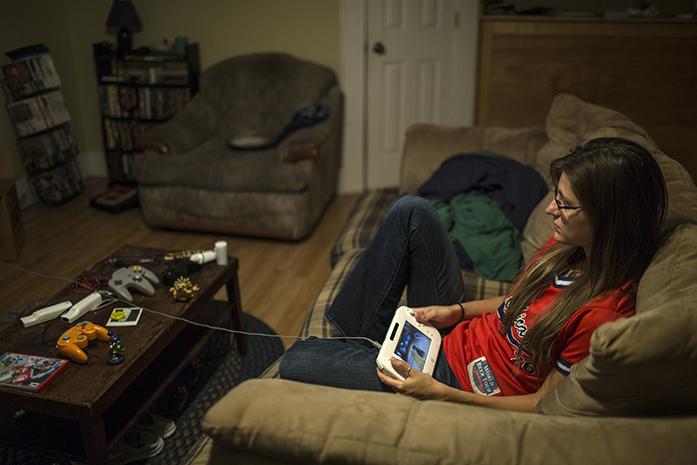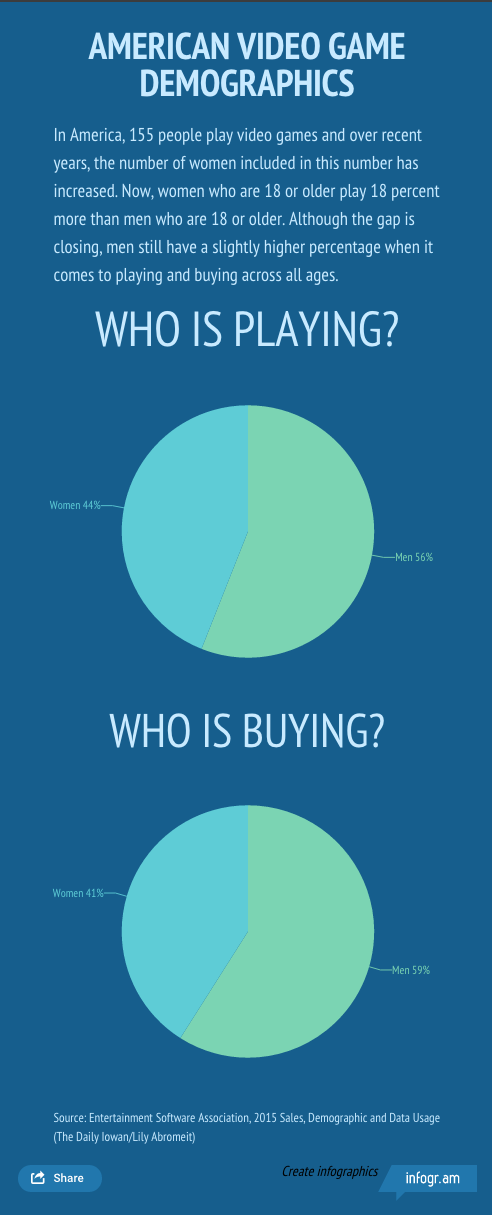By James Hirsch
[email protected]
Imagine entering an online gaming session only to be harassed, kicked out, and blocked just because of your gender.
Such harassment is a regular occurrence for University of Iowa freshman Ana Munson, she said.
“I got messages asking if they could be my boyfriend, which was really annoying,” Munson said. “Apparently, if a girl’s playing a game, she’s looking to date, too.”
According to a 2015 study by the Entertainment Software Association, 44 percent of video-game audiences are females, a steady increase over the past few years. Other studies have found that discrimination against females is prevalent.
Munson said she has been harassed by male players in a variety of ways, such as being followed around in games to be “protected” or receiving photos of the other players’ faces without asking. She said the abusive behavior tends to be from younger guys.
The association’s study also found the number of females over the age of 18 represent a greater portion of the gaming demographic (33 percent) than males 18 and younger (15 percent).
Freshman Keenan White used to play Call of Duty professionally. Now, he said, he has mostly settled down and plays with the same group of people — many of whom are females. He said he appreciates the dynamic.
“Every once in a while, you’ll find a guy that’s sexist and thinks that video games are a guy thing,” White said. “If I do find a guy that’s like that, I usually block them or mute them. The group that I play with mostly prefers to play with girls because they’re more laid-back and they’re just there to have fun, generally.”
Hannah Scates Kettler, a UI digital humanities librarian who teaches a seminar called Sex in Gaming, said her students are equally split between male and female.
“I think the fact nearly half of gamers are female was surprising to a lot of them,” she said. “Once they digested that, they were much more interested in the fact that things are the way they are and why it’s like that, given that it’s not male-dominated anymore.”
Scates Kettler said video-game marketing is still mainly geared toward males. These advertisements, she said, rely heavily on sexualizing women and empowering men, which could be why females took longer to get into gaming than males.
“You can look at marketing strategies up until now, and it’s always been boys in the advertisements,” Scates Kettler said. “So, automatically without seeing yourself within advertising, you assume you don’t belong.”
UI art Associate Professor Peter Chanthanakone advises the UI student club EPX, where members work together to produce one casual game a year. Munson said she checked out the club and was happy to see so many women there.
Chanthanakone said when video games first entered the industry, many companies went bankrupt. Now, he said, developers are learning to focus on making games that not only have entertainment value but can also generate revenue.
“I think back in the ’80s, they were just testing out the technology,” Chanthanakone said. “Today, we have more of a business mentality when we’re producing games. There seems to be a want to have more of a unisex appeal to not only the design but also the game play.”
He cited the mobile game Candy Crush as something that caters its design more toward females, even though there are still male players.
“There is definitely subjectivity to the aesthetic of what you’re seeing on your screen,” Chanthanakone said. “That design can cater to both genders; even certain male dominated games, such as World of Warcraft, still have female characters so female gamers can relate.”
White said one thing he loves about the video-game community is how diverse it is — he thinks anyone can play video games. He said he is glad that studies are showing more females getting into the gaming world.
“It just means social boundaries are being taken down, and it’s harder to find reasons that you can’t do something you want, like video games,” White said. “It’s a positive reinforcement to the fact that we’re evolving as a society and kind of seeing who the person is as a person rather than just their gender.”




